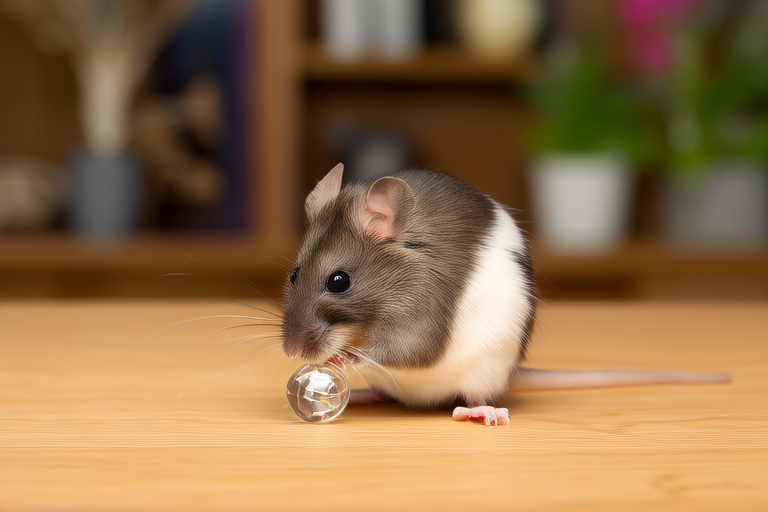Common Myths About Fancy Rats Debunked
Fancy rats, also known as domesticated brown rats, are popular pets cherished for their intelligence, sociability, and affectionate nature. Despite their appealing traits, many misconceptions circulate regarding these delightful creatures. It’s crucial to dispel these myths to ensure that fancy rats receive the proper care and respect they deserve. This article aims to shed light on some of the most prevalent myths surrounding fancy rats and provide accurate, scientifically-backed information.
Myth 1: Fancy Rats Are Dirty Animals
One of the most common misconceptions about fancy rats is that they are inherently dirty animals. In reality, fancy rats are clean creatures that spend a significant portion of their day grooming themselves. They are meticulous about keeping their fur and living space tidy, much like cats. However, due to their small size and tendency to explore, it’s essential to maintain their living environment by regularly cleaning their cages and providing them with fresh bedding.
Scientific studies have shown that rats have highly developed olfactory systems, which they use not only for detecting food but also for recognizing familiar scents. This keen sense of smell helps them identify areas in their habitat that need attention. Therefore, keeping their enclosure clean is more about maintaining hygiene standards rather than addressing any inherent dirtiness in the rats themselves.
Myth 2: Fancy Rats Bite Frequently
Another myth about fancy rats is that they bite often. While it’s true that all animals can bite if provoked or frightened, fancy rats are generally gentle and rarely aggressive towards humans. Their biting behavior is usually a sign of fear, pain, or discomfort, rather than aggression.
Research indicates that rats are highly social animals that thrive on interaction with their human companions. When handled correctly and given time to acclimate, fancy rats become affectionate and enjoy physical contact. To prevent bites, it’s important to handle your rat gently, avoid sudden movements, and ensure that your hands are free of strong odors or residues that might trigger defensive responses.
Myth 3: Fancy Rats Live Very Short Lives
Many people believe that fancy rats have extremely short lifespans, typically under a year. This misconception likely stems from the shorter life expectancy of wild rats, which face numerous environmental challenges. In contrast, domesticated fancy rats, when provided with appropriate care, can live between two to three years.
The longevity of fancy rats depends largely on factors such as diet, housing conditions, and veterinary care. A well-balanced diet rich in nutrients, a spacious cage with plenty of room for exercise, and regular health check-ups can significantly extend their lifespan. Scientific studies have demonstrated that proper care can lead to healthier, longer-lived rats.
Myth 4: Fancy Rats Spread Diseases Easily
There’s a widespread belief that fancy rats are disease carriers and can easily spread illnesses to humans. While it’s true that all animals can carry pathogens, the risk of contracting diseases from properly cared-for fancy rats is minimal. In fact, many of the diseases associated with rats are more commonly found in wild populations or poorly maintained pet environments.
Proper hygiene practices, including regular cleaning of their living spaces and washing hands after handling, can further reduce any potential risks. Additionally, ensuring that your rats receive routine veterinary care, including vaccinations and parasite control, can help safeguard their health and prevent the spread of diseases.
Myth 5: Fancy Rats Are Nocturnal Creatures
It’s often thought that fancy rats are strictly nocturnal animals, meaning they are active only during the night. While it’s true that rats are more active at night, they are not exclusively nocturnal. In the wild, their activity patterns may vary depending on environmental factors, but in captivity, their behavior adapts to the presence of their human caregivers.
Studies have shown that fancy rats can be quite adaptable and will adjust their activity levels to suit their environment. Many pet owners find that their rats are active during the day, especially when interacting with their human companions. Providing a stimulating environment with toys, tunnels, and other enrichment activities can encourage daytime play and exploration.
Caring for Your Fancy Rat
Now that we’ve debunked some common myths about fancy rats, let’s discuss how to provide them with the best possible care. Proper nutrition is crucial; a balanced diet consisting of high-quality rat pellets, fresh fruits, vegetables, and occasional treats can keep your rat healthy and happy. Always consult with a veterinarian to determine the specific dietary needs of your pet.
Adequate housing is another key factor in ensuring your rat’s wellbeing. Provide a spacious cage with multiple levels, allowing for climbing and exploration. Include soft bedding, such as shredded paper or recycled paper products, to create a comfortable sleeping area. Regular cleaning of the cage and changing the bedding can help maintain good hygiene and prevent health issues.
Socialization and mental stimulation are equally important. Spend time interacting with your rat daily, offering opportunities for play and bonding. Provide toys, tunnels, and other enrichment items to stimulate their minds and keep them engaged. Remember, a happy, healthy rat is a result of attentive care and a nurturing environment.
In conclusion, fancy rats are intelligent, social, and loving pets that deserve to be understood and appreciated for who they truly are. By debunking common myths and providing accurate information, we can foster a better understanding of these wonderful animals and ensure they receive the care they need to thrive. With the right knowledge and dedication, you can provide a fulfilling and enriching life for your fancy rat companion.
